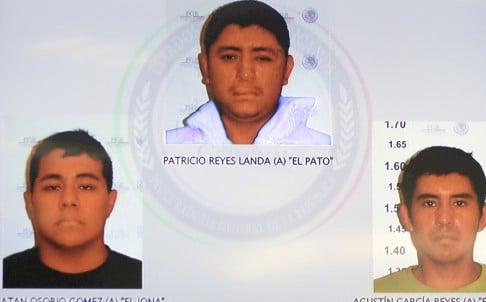Mexican gang members admit killing students, burning bodies and throwing remains in river
Confessions by suspected gang members indicate that 43 Mexican students missing for six weeks were killed, burned beyond recognition and tossed in a river in a case that outraged the nation, authorities said on Friday.
Facing angry protests in the biggest crisis of his administration, President Enrique Pena Nieto vowed to hunt down all those responsible for the "horrible crime."
Authorities have been searching for the aspiring teachers since gang-linked police attacked their buses in the southern city of Iguala on September 26, allegedly under orders of the mayor and his wife in a night of terror that left six people dead.
"To the parents of the missing young men and society as a whole, I assure you that we won't stop until justice is served," Pena Nieto said.
If the testimonies are proven true, it would be one of the worst massacres in a drug war that has killed more than 80,000 people and left 22,000 others missing since 2006.
Attorney General Jesus Murillo Karam warned that it would be difficult to identify the charred remains and that authorities will continue to consider the students as missing until DNA tests confirm the identities.
He added, however, that there was "a lot of evidence ... that could indicate it was them."
Three Guerreros Unidos gang members confessed to killing the students, all men, after police handed them over between Iguala and the neighbouring town of Cocula, Murillo Karam said, showing videos of the taped confessions.
 Iguala's ousted mayor Jose Luis Abarca and his wife Maria de los Angeles Pineda were detained in Mexico City district on Tuesday after more than a month on the run. Photo: AP
Iguala's ousted mayor Jose Luis Abarca and his wife Maria de los Angeles Pineda were detained in Mexico City district on Tuesday after more than a month on the run. Photo: AP
The bodies were set on fire down a hill from a Cocula garbage dump with petrol, tyres, firewood and plastic, in an inferno that lasted 14 hours, he said.
"The fire lasted from midnight to 2pm the next day. The criminals could not handle the bodies until 5pm due to the heat," he said.
The suspects then crushed the remains, stuffed them in bags and threw some in a river.
Murillo Karam showed videos of investigators combing through small pieces of charcoal-like remains that were found in black plastic bags. Some remains were found near the landfill.
The gang members were not sure how many students they received but one of them said there were more than 40.
Murillo Karam delivered the news to the relatives of the missing in an airport hangar in Chilpancingo, capital of the violence-plagued southern state of Guerrero.
But the parents, who distrust the government, said they would not accept that their children are dead until they get a final ruling from independent Argentinian forensic experts who are taking part in the investigation.
"As long as there is no proof, our sons are alive," Felipe de la Cruz, a spokesman for the families, said at a news conference from the missing young men's teacher-training college near Chilpancingo.
Last month, two hitmen had already confessed to killing 17 of the students and dumping them in a mass grave near Iguala. But authorities said tests showed none of the 28 bodies found in the pit belonged to the students.
Murillo Karam said experts from an Austrian university would help identify the charred remains.
Authorities have now detained 74 people, including several Guerreros Unidos members, 36 Iguala and Cocula police officers and Iguala's ousted mayor Jose Luis Abarca and his wife Maria de los Angeles Pineda.
The mayoral couple were detained in a gritty Mexico City district on Tuesday after more than a month on the run.
 Students take part in a protest in support of the 43 missing students outside the Mexican Embassy in Bogota, Colombia. Photo: Reuters
Students take part in a protest in support of the 43 missing students outside the Mexican Embassy in Bogota, Colombia. Photo: Reuters
Authorities say Abarca ordered the officers to confront the students over fears they would derail a speech by his wife, who headed the local child protection agency.
The missing young men said they went to Iguala to raise funds, though they hijacked four buses to move around, a common practice among students from the radical teachers college.
The crisis forced Pena Nieto to shorten a major upcoming trip to China and Australia by four days, which will now run from Sunday to next Saturday.
Human Rights Watch dubbed the mass disappearance "one of the gravest cases recorded in the contemporary history of Mexico and Latin America."
Fed up with years of relentless violence, tens of thousands of Mexicans held a new protest over the Iguala case on Wednesday.




